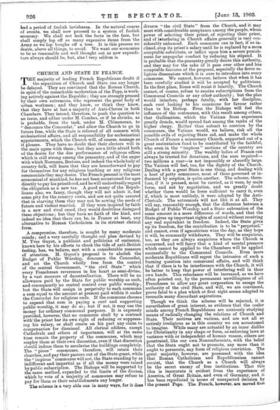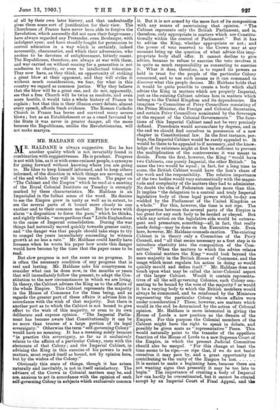CHURCH AND STATE IN FRANCE. T HE majority of leading French
Republicans doubt if the separation of Church and State can any longer be delayed. They are convinced that the Roman Church, in spite of the remarkable moderation of the Pope, is work- ing actively against the Republic ; they are strongly pressed by their own extremists, who represent the great body of urban workmen ; and they know, or think they know, that they have at last a majority of Anti-Clerics in both Chambers. They intend, therefore, to push the question to an issue, and either under M. Combes, or if he shrinks, as is probable, from the task, under M. Clemenceau, to " denounce the Concordat," and allow the Church to go in future free, while the State is relieved of all concern with ecclesiastical affairs, and all responsibility for ecclesiastical appointments, which the Church will, of course, manage as it pleases. They have no doubt that their electors will in the main agree with them; but they are a little afraid both of the desire for the due performance of religious offices which is still strong among the peasantry, and of the anger with which Normans, Bretons, and indeed the whole body of country folk, will learn that they are henceforward to pay for themselves for any religious teaching or any religious ceremonials they may desire. The French peasant is the most economical of mankind, he has not been accustomed for ages directly to pay his priesthood, and he will undoubtedly regard the obligation as a new tax. A good many of the Repub- licans also, we fancy, though they will not admit it, feel some pity for the country cures, and are not quite assured that in starving them they may not be sowing the seeds of future and violent reaction. If they were inspired by faith in a new and rival creed, they would doubtless disregard these objections ; but they have no faith of the kind, and indeed no idea that there can be, in France at least, any alternative to Roman Catholicism in its strictest clerical form.
A compromise, therefore, is sought by many moderate minds; and a very carefully thought out plan devised by M. Yves Guyot, a publicist and politician of eminence, known here by his efforts to check the tide of anti-British feeling, has, we believe, met with a considerable measure of attention. M. Guyot's proposal is to abolish the Budget of Public Worship, denounce the Concordat, and set the Church wholly free from the control of the central Government, " the civil State " which. every Frenchman reverences in his heart as semi-divine, by a vast measure of decentralisation. There will be no allowance paid by the State for public worship as such, and consequently no central control over public worship ; but the State will assign in perpetuity to each commune a sum equal to the amount at present paid within it under the Concordat for religious ends. If the commune chooses to expend that sum in paying a cure and supporting public worship, it may do so ; but if not, it may use the money for ordinary communal purposes. It is expressly provided, however, that no commune shall by a contract with' the priest bar its own right of reducing or suppress- ing his salary, or shall create on his part any claim to compensation for dismissal. All clerical edifices, except Cathedrals and others of importance, will at the same time remain the property of the communes, which may employ them at their own discretion, even if that discretion should induce them to secularise the buildings completely. The " pious " communes, therefore, will retain their churches, and pay their pastors out of the State grant, while the " impious " communes will not, the State standing by as indifferent and impartial as if all the money were raised by public subscription. The Bishops will be supported by the same method, expanded to the limits of the diocese, which by vote of a majority of communes may refuse to pay for them or their establishments any longer.
The scheme is a very able one in many ways, for it does divorce " the civil State" from the Church, and it may meet with considerable acceptance among the people, whose power of selecting their priest, of rejecting their priest, and of iaterfering in Church affairs generally is very con- siderably enhanced. Each commune can in fact, if so in- clined, stop its priest's salary until he is replaced by a more acceptable substitute, or inflict upon him a severe punish- ment for unpopular conduct by reducing his stipend. It is probable that the peasantry greatly desire this authority, and they may for the sake of it pass over other and less acceptable features of the proposal, especially the fierce re- ligious dissensions which it is sure to introduce into every commune. We cannot, however, believe that when it has been carefully studied it will be accepted by politicians. In the first place, Rome will resist it heartily. The Church cannot, of course, refuse to receive subscriptions from the Communal Councils or any other authority ; but the plan would interfere, perhaps fatally, with her discipline, each cure looking to his commune for favour rather than to his Bishop. Even the Bishops will feel the influence of the communes, with this result among others, that Gallicanism, which the Vatican from experience greatly dreads, would spread fast among the ranks of the higher clergy. Rather than submit to coercion by the communes, the Vatican would, we believe, risk all the possible evils of rejecting State aid, and make the whole Church of France a missionary Church, supported out of a great sustentation fund to be contributed by the faithful, who even in the " impious " sections of the country are still a strong minority. The wealthy ladies of France can always be trusted for donations, and the sum required— two millions a year—is not impossibly or absurdly large. The Vatican will feel, too, for the dignity of the Church. Dealing with a great State is one thing, and dealing with a host of petty communes, most of them governed or in- fluenced by sceptics, is quite another. The scheme, there- fore, if it is pressed, must be carried, as it were, by main force, and not by negotiation, and we greatly doubt whether there would be force sufficient to carry it, even if, which is most unlikely, it were adopted by the Anti- Clericals. The extremists will not like it at all. They will say, reasonably enough, that the difference between a Budget of Public Worship and a State subvention of the same amount is a mere difference of words, and that the State gives up important rights of control without receiving any real equivalent in freedom. Indeed, the State gives up its freedom, for the contribution is to be "perpetual," and cannot, even if agnosticism wins the day, as they hope it will, be summarily withdrawn. They will be suspicious, too, as they are always suspicious where the Church is concerned, and will fancy that a kind of mental pressure which cannot be applied to the Chambers will be applied successfully to the Communal Councils. Even more moderate Republicans will regret the intrusion of such a burning question into' communal affairs, and will think that if there is to be interference with the Church, it will be better to keep that power of interfering well in their own hands. This reluctance will be increased, as we have often pointed out, by the permanent unwillingness of all Frenchmen to allow any great corporation to escape the authority of the civil State, and will, we are convinced, prove fatal to a plan which at first sight seems adapted to reconcile many discordant aspirations.
Though we think the scheme will be rejected, it is nevertheless of great interest, as evidence that the cooler minds among French Republicans are anxiously studying means of radically changing the relations of Church and State. Their motives are various, and are not all so entirely irreligious as in this country we are accustomed to imagine. While many are actuated by an inner dislike for Christianity in any shape or form, as enforcing laws at variance with or independent of human reason, others are penetrated, like our own Nonconformists, with the belief that the State ought not to promote, any more than it ought to persecute, any form of religious conviction. The great majority, however, are possessed with the idea that Roman Catholicism and Republicanism cannot coexist, that the Church as a Church will always be the secret enemy of free institutions. That this idea is inaccurate is evident from the experience of America, of Great Britain, and even of Germany, and it has been repudiated in terms of unexpected decision by the present Pope. The French, however, are moved first of all by their own later history, and that undoubtedly gives them some sort of justification for their view. The Churchmen of France have never been able to forgive the Revolution, which assuredly did not earn their forgiveness ; have always regarded any Pretender, even Boulanger, with indulgent eyes; and have steadily fought for permission to control education in a way which is certainly, indeed necessarily, obscurantist, and which their adversaries, who profess to be devotees of enlightenment, bitterly resent. The Republicans, therefore, are always at war with them, and war carried on without ceasing for a generation is not conducive to charity, or even to intellectual toleration. They now have, as they think, an opportunity of striking a great blow at their opponent, and they will strike it without much consideration, we fear, for what in this country we regard as common justice. Why they believe that the blow will be a great one, and do not, apparently, see that a free Church will be twice as resolute, and even more hostile, it would take a whole history of France to explain ; but that this is their illusion every debate, almost every speech, affords fresh evidence. The Roman Catholic Church in France has borne and survived many severe blows ; but as an Establishment or as a creed favoured by the State it was never in greater danger, all the more because the Republicans, unlike the Revolutionaries, will not make martyrs.











































 Previous page
Previous page